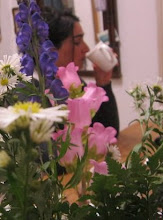The geography of thought
From a mindful critic by Julian Jonker about the book, Rhythm Science by Paul D. Miller, Cambridge: The MIT Press, 2004
"I live in a place where the progress of time is distributed as a fractal. It's complex, really. Or, as they say in mathematics, it's irreal, outside the cartesian geography of the real. Poses aside, there's no hope of keeping it real in this windswept city by the sea...The rhythm of this city measures the weight of the past rather than the lightness of the digital now, the unburdened flow of the current...You must understand, my city is a port city. It exists not as a place with roots in the soft earth of a continent, but as a point drifting along the routes that span oceans: oceans of sound, borrowing notes and rhythms from the trade winds."
"In four dimensions, this city is not a port, nor a point, but a vector: that which Miller describes as a "relation between a determinate and an indeterminate property". The vector, which has fixed dimensions but no fixed position, is the idea which can be recalled into any position in the geography of thought. The vector is the technology that transforms graffiti into wildstyle, that typographical art... . Rhythm Science is a vector: a DJ tool, ready to be played.
In this manner too, the city drifts in the mists of time and histories, waiting to be activated. It is without stated intentions, a city at play. Press play, and let the flow of histories coagulate into a mix. ."
"This is a world where all meaning has been untethered from the ground of its origins", says Miller, "and all signposts point to a road that you make up as you travel through the text." Identity is skinnable, like a winamp player: download the source. "Identity," says Miller, "is about creating an environment where you can make the world act as your own reflection."
"...Long ago, genocide replaced genealogy. Forgetting drifts along the trade routes. We track the silences, looking for patterns. We call this rhythm, and use it to count time. "





3 comments:
What reflects you, Moon?
the idea is tempting, isn't it?
it is hard for me to say it better then the writer does :)
she sums it up pretty well:
It reflects my own sensation that of the
rhythm of a City ...it's complexity.
the way the writer here describes own city by the ocean-it's sounds, it's "time that is distributed as a fractal" fascinates me, and mostly the sensation of the CITY as an entity "waiting to be activated"
walking the streets, absorbing the rhythm/color/movements/sounds/ wave of random activities and being a part of it all while being able to pause and be the observer, all this and more and mostly maybe the unknown
Dear Moon,
I am following your thought process into the pause. And what lies beyond that?
Post a Comment